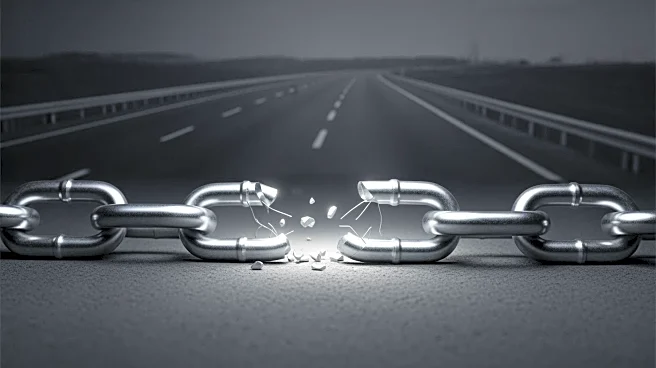What's Happening?
The U.S. trucking industry is facing significant challenges due to the practices of certain tort lawyers who are accused of exploiting the legal system for financial gain. These lawyers are reportedly
targeting truckers with exaggerated or fabricated claims, leading to substantial financial burdens on the industry and consumers. In 2022, tort costs in the U.S. reached $529 billion, representing 2.1% of the GDP, and are projected to rise to $900 billion by 2030. This situation has resulted in increased costs for goods and services, with families in states like Georgia and Texas paying thousands of dollars annually in lawsuit-related expenses. The trucking industry, which employs 8.4 million Americans and moves over 70% of domestic freight, is particularly vulnerable to these legal practices.
Why It's Important?
The impact of these legal practices extends beyond the trucking industry, affecting the broader U.S. economy and consumers. The financial strain on the trucking industry can lead to higher costs for goods and services, as these expenses are passed down to consumers. Small trucking companies, which make up over 90% of the industry, are especially at risk, with many facing the threat of closure due to 'nuclear verdicts'—awards exceeding $10 million. This not only jeopardizes jobs but also disrupts supply chains, potentially leading to shortages and increased prices for everyday products. The call for legislative reform aims to address these issues by capping non-economic damages and increasing transparency in litigation funding.
What's Next?
There is a growing push for legislative reform to curb the practices of tort lawyers and protect the trucking industry. Proposed measures include the FAIR Trucking Act, which seeks to end forum shopping by granting federal courts jurisdiction over large cases, and imposing transparency on third-party litigation financiers. States like Colorado and Georgia are already taking steps to cap non-economic damages and expose litigation funding. If successful, these reforms could restore balance to the legal system, reduce costs for consumers, and protect jobs within the trucking industry.
Beyond the Headlines
The practices of tort lawyers raise ethical concerns about the manipulation of the legal system for profit. The involvement of third-party financiers in litigation, while legal, is seen as unethical and harmful to consumers. This situation highlights the need for a more equitable legal framework that prioritizes justice over financial gain. The trucking industry, as a vital component of the U.S. economy, requires protection from exploitative legal practices to ensure its continued contribution to economic stability and growth.










